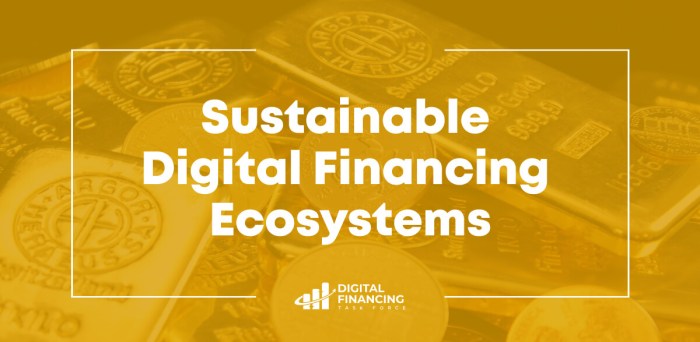
Digital finance trends for building a sustainable financial ecosystem sets the stage for this enthralling narrative, offering readers a glimpse into a story that is rich in detail and brimming with originality from the outset.
The emergence of digital finance has revolutionized the financial landscape, paving the way for innovative trends that are reshaping the industry. This exploration delves into the key aspects of digital finance and its pivotal role in fostering a sustainable financial ecosystem.
Digital Finance Trends for Building a Sustainable Financial Ecosystem
Digital finance refers to the use of digital technologies to deliver financial services and conduct financial transactions. In today’s rapidly evolving financial landscape, digital finance plays a crucial role in shaping the way individuals and businesses manage their money. By leveraging innovative technologies such as mobile banking, blockchain, and artificial intelligence, digital finance is transforming traditional financial systems and paving the way for a more inclusive and sustainable financial ecosystem.
Key Trends in Digital Finance
- Blockchain Technology: Blockchain technology, with its decentralized and secure nature, is revolutionizing the way financial transactions are carried out. By eliminating intermediaries and ensuring transparency, blockchain is enhancing trust in financial systems and reducing costs.
- Mobile Banking: The widespread adoption of smartphones has led to the rise of mobile banking services, enabling individuals to access banking services anytime, anywhere. Mobile banking promotes financial inclusion by providing underserved populations with convenient and affordable banking solutions.
- Artificial Intelligence and Machine Learning: Artificial intelligence and machine learning algorithms are being used in financial services to automate processes, detect fraud, and personalize customer experiences. These technologies improve efficiency, reduce risks, and enhance customer satisfaction.
Promoting Financial Inclusion and Accessibility
- Digital Payment Solutions: Digital payment solutions such as mobile wallets and peer-to-peer payment platforms are expanding access to financial services for individuals who are unbanked or underbanked. These solutions offer a convenient and cost-effective way to send and receive money.
- Microfinance and Peer-to-Peer Lending: Digital finance innovations have enabled the growth of microfinance institutions and peer-to-peer lending platforms, providing small businesses and individuals with access to credit and investment opportunities. This promotes entrepreneurship and economic empowerment.
- Regulatory Sandboxes: Regulatory sandboxes allow fintech companies to test innovative financial products and services in a controlled environment, fostering innovation while ensuring consumer protection. By facilitating experimentation, regulatory sandboxes drive the development of inclusive and sustainable financial solutions.
Finance Insights Daily
Staying updated with finance insights on a daily basis is crucial in today’s fast-paced and ever-changing financial landscape. Having access to timely and accurate information can help individuals make informed decisions, stay ahead of market trends, and navigate potential risks effectively.
Importance of Daily Finance Insights
Being aware of the latest financial news, market developments, and economic indicators can provide valuable insights that individuals can leverage to optimize their financial strategies and achieve their goals. Here are some key benefits of staying updated with finance insights on a daily basis:
- Identifying investment opportunities: Real-time financial information can help individuals identify potential investment opportunities and make informed decisions on where to allocate their funds.
- Risk management: By staying abreast of market trends and economic indicators, individuals can proactively manage risks and adjust their portfolios accordingly to protect their wealth.
- Financial planning: Access to daily finance insights can aid individuals in creating and adjusting their financial plans to align with their short-term and long-term goals.
Examples of Valuable Financial Insights
Here are some examples of valuable financial insights that individuals can benefit from on a daily basis:
- Stock market performance:Tracking the performance of key stock indices and individual stocks can help individuals make informed decisions on buying, selling, or holding investments.
- Interest rate changes:Monitoring changes in interest rates can provide insights into borrowing costs, savings rates, and overall economic health.
- Global economic indicators:Keeping an eye on global economic indicators such as GDP growth, inflation rates, and unemployment figures can offer valuable insights into the broader economic landscape.
Impact of Real-Time Financial Information
Real-time financial information has a significant impact on decision-making processes, as it allows individuals to react quickly to market developments and adjust their strategies accordingly. By staying updated with real-time data, individuals can make more informed decisions, mitigate risks, and seize opportunities in a timely manner.
Smart Finance Word
Smart Finance refers to the use of technology and digital tools to manage personal finances in a more efficient, automated, and data-driven manner. It involves leveraging algorithms, artificial intelligence, and other advanced technologies to make informed financial decisions and optimize financial resources.
Technology Transformation in Financial Practices
Smart finance solutions have revolutionized traditional financial practices by providing real-time insights, personalized recommendations, and automated processes. These tools streamline budgeting, investing, and expense tracking, offering users a comprehensive view of their financial health.
- Automation: Smart finance tools automate repetitive tasks such as bill payments, savings transfers, and investment portfolio rebalancing, saving time and reducing human error.
- Personalization: These solutions analyze individual financial data to offer tailored recommendations for budgeting, saving goals, investment strategies, and debt management.
- Data-driven Decisions: By leveraging big data and analytics, smart finance tools provide users with valuable insights into their spending patterns, investment performance, and overall financial well-being.
Benefits of Adopting Smart Finance Tools
Embracing smart finance tools can bring numerous advantages for both individuals and businesses, enhancing financial management practices and promoting long-term financial sustainability.
- Improved Financial Awareness: Smart finance tools offer a holistic view of one’s financial situation, helping users understand their cash flow, savings progress, and investment performance.
- Efficiency and Time Savings: Automation and digitalization streamline financial tasks, allowing users to focus on strategic money decisions rather than administrative chores.
- Enhanced Decision-making: Data-driven insights empower users to make informed financial decisions, optimize their investment portfolios, and adjust their spending habits based on real-time feedback.
- Increased Security: Smart finance tools prioritize data encryption, secure transactions, and multi-factor authentication to protect users’ financial information from fraud and cyber threats.
Financial Advisor
Financial advisors play a crucial role in assisting individuals and businesses in achieving their financial goals by providing personalized guidance and recommendations based on their unique financial situations.
Role of a Financial Advisor
Financial advisors offer a wide range of services, including creating financial plans, investment advice, retirement planning, tax planning, and estate planning. They work closely with clients to understand their financial objectives and develop strategies to help them reach those goals.
Comparison of Traditional vs. Digital Financial Advisory Services
- Traditional Financial Advisory Services:
- Personalized Approach: Traditional advisors offer face-to-face interactions and personalized guidance tailored to individual needs.
- Relationship Building: They focus on building long-term relationships with clients and providing comprehensive financial solutions.
- Expertise and Experience: Traditional advisors often have years of experience and expertise in the financial industry.
- Digital Financial Advisory Platforms:
- Convenience: Digital platforms offer easy access to financial advice anytime, anywhere, through online tools and mobile apps.
- Cost-Effective: They may have lower fees compared to traditional advisors, making financial advice more accessible to a broader audience.
- Automation: Digital platforms may use algorithms and robo-advisors to provide recommendations based on data analysis and algorithms.
Advantages and Limitations of Using a Financial Advisor
- Advantages:
- Personalized Guidance: Financial advisors offer tailored advice based on individual financial goals and circumstances.
- Expertise and Experience: They bring knowledge and experience to help navigate complex financial decisions.
- Holistic Approach: Advisors can provide comprehensive financial planning, covering various aspects like investments, insurance, and retirement.
- Limitations:
- Cost: Traditional advisors may have higher fees, while digital platforms may lack the personalized touch of face-to-face interactions.
- Dependency: Relying solely on a financial advisor may limit individuals from gaining a deeper understanding of their finances and making independent decisions.
- Market Volatility: Advisors may not always predict or prevent market fluctuations, impacting investment outcomes.
Future Skills Program
In today’s rapidly evolving finance industry, acquiring future skills is crucial to stay ahead and thrive in the digital finance landscape. As technology continues to reshape the way financial services are delivered, individuals must develop a diverse set of skills to succeed in their careers.
Key Skills for Digital Finance Career
- Understanding of Data Analytics: Proficiency in data analytics is essential for analyzing trends, predicting customer behavior, and making informed financial decisions.
- Cybersecurity Knowledge: With the rise of digital transactions, having a strong understanding of cybersecurity measures is critical to protect sensitive financial information.
- Blockchain Expertise: Knowledge of blockchain technology is becoming increasingly important in digital finance for secure and transparent transactions.
- AI and Machine Learning Skills: Understanding AI and machine learning algorithms can help in automating processes, enhancing customer experiences, and improving decision-making.
Adapting Educational Programs for Future Roles
Educational programs need to adapt to equip individuals with the necessary skills for future roles in the finance sector. This includes incorporating hands-on training with emerging technologies, providing real-world case studies, and offering opportunities for internships or practical experience in digital finance companies.
By fostering a learning environment that encourages innovation and collaboration, educational institutions can better prepare students for the demands of the digital finance industry.
Outcome Summary

In conclusion, the evolution of digital finance trends presents a promising future for a sustainable financial ecosystem, highlighting the transformative power of technology in reshaping financial practices. As we navigate through these trends, it becomes evident that embracing digital finance is essential for financial inclusion and accessibility in today’s dynamic world.
Question & Answer Hub
What role does digital finance play in shaping the financial landscape?
Digital finance revolutionizes traditional financial practices by leveraging technology to enhance efficiency and accessibility, ultimately shaping a more dynamic and inclusive financial landscape.
How are digital finance innovations promoting financial inclusion and accessibility?
Digital finance innovations, such as mobile banking and blockchain technology, are expanding access to financial services for underserved populations, fostering greater financial inclusion and promoting economic empowerment.
What are some key skills essential for a successful career in digital finance?
Key skills for a successful career in digital finance include data analysis, financial modeling, cybersecurity expertise, and a deep understanding of financial technologies like blockchain and artificial intelligence.







